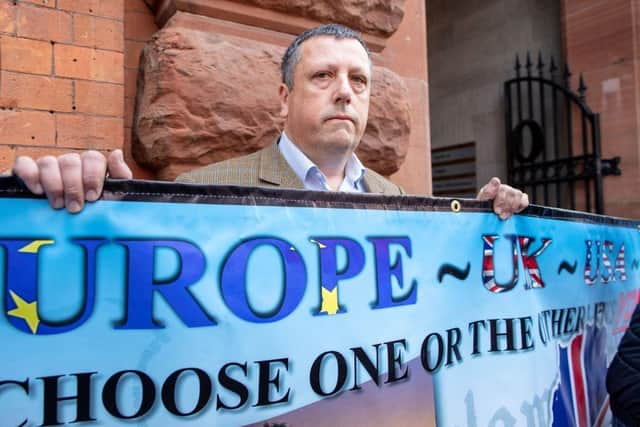DUP deal: Loyalist Communities Council chairman David Campbell says that a Sinn Fein First Minister for Northern Ireland is 'anti-democratic'
and live on Freeview channel 276
David Campbell made the point that it was the 1998 Good Friday Agreement which was endorsed by the Northern Irish public in a referendum, not the 2006 St Andrews Agreement.
The Good Friday Agreement had stated that the First Minister should be elected by the whole Assembly – meaning in practice that they would come from the biggest bloc in the Assembly, whether it be unionist or nationalist.
Advertisement
Hide AdAdvertisement
Hide AdBut the 2006 deal, brokered between the DUP and Sinn Fein, amended this so that the biggest party instead would appoint someone to the post.


And since unionism remains the biggest bloc in the Assembly (37 MLAs to 35 nationalist ones, and 18 other), if the 1998 deal still applied unionists would be choosing the First Minister today, even though Sinn Fein is the biggest single party.
The LCC which Mr Campbell chairs is a forum for representatives from the mainstream ranks of the UVF, UDA and Red Hand Commando to come together (as opposed to their semi-detached splinter groups).
Mr Campbell said a meeting will be held of the LCC in the next 48 hours to discuss the latest developments.
Advertisement
Hide AdAdvertisement
Hide AdBut on the issue of Michelle O'Neill as First Minister, he said: "A Sinn Fein First Minister has no different status than a Sinn Fein deputy First Minister.
"The two posts are co-equal – neither can function without the other partner.
"So, Northern Ireland will be led by a Sinn Fein First and DUP Deputy First Minister, not by a Sinn Fein First Minister acting solo.
"However, a Sinn Fein First Minister is in itself anti-democratic, as the Belfast Agreement specified that the First Minister should come from the largest community designation, not necessarily the largest party.
"This was usurped by the St Andrews Agreement which was never endorsed by referendum."